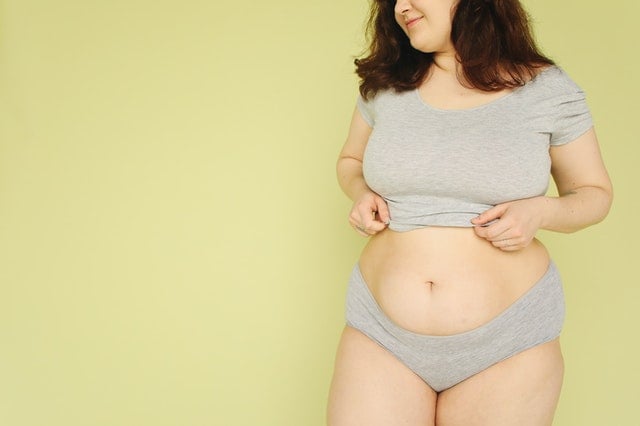Looking in the mirror, we notice our pants fit a little snugger and our shirt is pulling a little tighter.
Our body has changed during the pandemic.
For those of us who have gained weight, it can be difficult to cope.
Often, much of our identity has been built around how others perceive us, how we show up in the world, and when our appearance changes, it can feel like we no longer know who we are, we become afraid of what others will think.
One of the most difficult struggles when it comes to weight gain is thinking that we have failed—that the way we look is wrong. We have conditioned ourselves to believe that weight gain is bad and weight loss is good, and we praise each other accordingly.
But what if we took a second to really understand what it means for our body to gain weight. What it means in the middle of a global pandemic for us to have put on some pounds.
Well, what we are perceiving as failure is actually a protection mechanism.
From the moment we are born, food is life, food is love, food is connection, food is bonding. The positive associations we have with food—the ones that have been perpetuated since we were born—do not go away with time, rather they strengthen as we age.
So even though it may not seem like it, every time that we’re reaching for food when we’re not actually hungry, it’s our body’s way of trying to help us.
I get that it might seem confusing, as from our perspective, eating when we’re not hungry seems like a self-sabotaging and frustrating behavior. But let’s unravel that mindset.
The world right now is stressful, overwhelming, unpredictable, and we’re feeling out of control.
What is the one thing that we have readily available to us cope with stress, feelings of unpredictability, and lack of control—the one thing that has historically made us feel better? If you guessed food, you’re right.
Our body knows this, so every time we are feeling the impact of this pandemic, it wants to help us and be our friend by telling us to go get that one thing that helps us cope. We then meet this with guilt, shame, and frustration, not understanding that our body is trying to help us not hurt us. This is because our body has one main objective: to keep us alive. We have been biologically designed to avoid pain, as thousands of years ago it was strongly correlated with death.
And what about stress? Stress is the anticipation of pain and our body’s way of trying to move us away from and alert us of potential danger. So here is what is happening: we’re stressed, we’re overwhelmed, we’re frustrated, and our body understands this. In order to keep us alive, it encourages us to eat food.
As a result, our weight has changed and we see this as something bad—something to be fixed—as opposed to our body’s resourceful way of coping.
Now let’s talk about why we want to have a certain body size. When we tell ourselves that we want to lose weight, what we’re really saying is we want to feel loved, we want to feel connected, we want to feel good enough.
Our society has told us that weight loss is the key to these things, but this is a lie because we can never fill an internal void with external things. Meaning that changing our external appearance will never allow us to fulfill the needs of connection, love, and self-worth.
Knowing this, we can bypass the part about feeling like we need to lose weight by going right to the part where we seek out what we truly need.
How do we do that? Here are some tips that I’ve found helpful:
1. Reach out to those around you and connect as much as you can.
When our brain is desperate for connection and isn’t receiving it, it will seek out a reason why, and often we will default to an old answer, which is that our body is the problem. Wrong. Our body is not the problem; it is not the reason for disconnection.
We need to override our brain’s desire to blame our body, and we do this by seeking out connections to prove to ourselves that the love and friendship in our life is not dependent on the size of our body. Zoom calls, FaceTime, socially distanced meet-ups (if permitted), phone calls, and whatever we can do right now to foster a feeling of connection will help to alleviate the fixation we have on changing our weight.
2. Provide evidence for our brain that it is safe to exist in a body that has gained weight.
We also need to show ourselves that happiness, love, connection, and feeling like we are good enough is available to us right now.
One of the best ways to do this is by creating a virtual environment where we see ourselves represented. Our brain works off of evidence to know that something is safe, and how it knows that something is safe is through exposure and familiarity.
What we need to do is go through our social media feed and remove accounts that make us feel like we are not good enough as we are or that we need to lose weight in order to feel loved. We want to add in more accounts of people with our body size or larger because we want to prove to our brain that it is safe and possible for us to be happy in a different size body.
Bonus tip: if you’re really struggling with one particular body part, for example cellulite, be sure to add in accounts from people who have cellulite in order to normalize, familiarize, and create a feeling of safety and connection to the people in your virtual environment.
3. Get rid of all the clothes that no longer fit and replace them (if you can).
When we’re dressing ourselves in clothes that don’t actually fit our body, it makes us feel terrible about ourselves. And in order to make ourselves feel better, we turn to self-soothing mechanisms, which tend to involve things like food.
We want to create a feeling of empowerment and confidence within our own body, which means dressing our body accordingly. Donate the clothes that no longer make you feel capable of living an incredible life, and bring in clothes that do.
4. Changing our negative self-talk.
When we look in the mirror and tell ourselves that we are gross, disgusting, and a failure for having gained weight, what we’re doing is causing ourselves to feel shame. What happens when we feel shame in our body? Well, shame triggers the same area in our brain as pain, and as we know, when we are in pain our brain thinks that there is a threat to our survival and will do everything it can to avoid it.
This often looks like numbing out and distracting with self-soothing behaviors, including reaching for highly palatable, delicious foods. So, ironically, by beating ourselves up and speaking to ourselves negatively, we’re actually encouraging the opposite behavior and results of what we want.
We need to speak to ourselves with as much self-compassion as we can knowing that at any given moment we’re doing the best that we can—and so is our body. Positive self-talk produces positive action (taking care of ourselves) and negative self-talk produces negative action (self-soothing as a result of self-inflicted shaming).
We will never shame ourselves into a body that we love, but rather we can love ourselves into taking more actions that help support our body.
5. See weight change as an opportunity to connect with ourselves on a deeper level, to be reminder that we are more than a body.
We are not alone in feeling frustrated with weight change. I talk with people all around the world every day about this topic. However, our body is the least interesting thing about us. It simply carries us from point A to Point B, like a personal delivery system.
We need to embrace this opportunity to connect with ourselves knowing that the only constant in life is change, and the same is true for our body. The more we get attached to keeping our body the same, the more unhappy we will be. It is normal for our body to change; nothing has gone wrong, nothing is broken. We’re simply being human, and our body is keeping us alive. And the fact that you’re reading this right now means that it’s doing an excellent job.
I’ll leave you with a journal prompt to help you to reflect and integrate. Write it at the top of a blank page and jot down everything that comes to mind.
My body is the least interesting thing about me because_________.
Brag, dig deep, get curious, get compassionate, and uncover who you really are—because you are not your body.
~


 Share on bsky
Share on bsky





Read 10 comments and reply